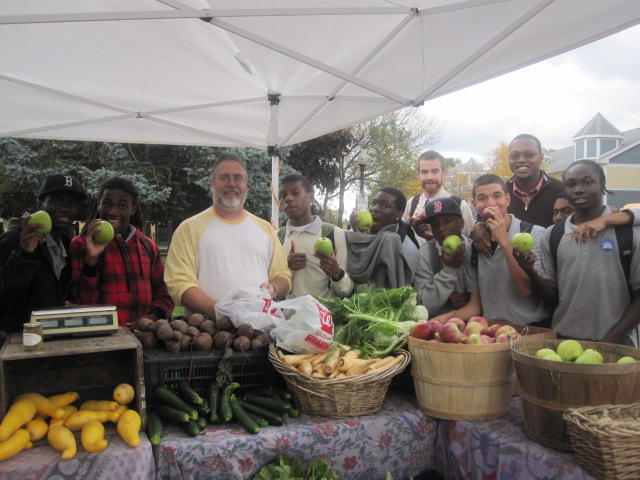We read about food deserts, but this afternoon, I was reminded what it means to work smack dab in the center of one. At Codman Academy, in Dorchester, Mass., our Nutrition Action Club has organized Junk Food Free Spring, and to keep students motivated to follow through on their pledges, we've introduced healthy snacks after school on Mondays and Wednesdays. A dozen ninth grade boys use their free period to serve as chefs.
"I've never tasted a cantaloupe," a boy casually commented as he was slicing melons. "I didn't know what cantaloupes were," another boy noted. "Can we take some of the strawberries home?" a student asked.
In the public health and medical literature, there is enormous pessimism about our ability to change behavior in high school students. Most schools have ceded food quality entirely as an area of concern. The federal government, through the school breakfast, lunch and snack program, is the single largest provider of food to low-income children, investing $12 billion in cash and commodity programs in 2008 to over 100,000 schools and programs. Eliminating reimbursement for whole milk, fried foods, high sodium or foods with any trans fat are logical, substantive first steps. Some districts have banned vending machines, but billions of dollars of unhealthy food floods into schools unchecked through fast food outlets and corner stores. Junk food from the surrounding neighborhood was flooding into our school, too.
Like the anti-tobacco campaign, this is going to be a long, hard fight. But not impossible, and young people can be important front line advocates and leaders. Urban teens are often caregivers to younger siblings at home. The power of knowledge about healthy food -- as an issue of safety, equity and justice -- extends beyond the individual to the family and community.
Our pilot nutrition course, under the direction of Dr. Susanna Bedell and Wellness Director Mbakwe Okafor, began eight years ago. This is not an overnight fix, but a sustained, concerted commitment. A third of our students are pre-hypertensive or hypertensive, mirroring the third of adult African-Americans who are hypertensive nationally. We know salt and diet are major contributors to this epidemiological pattern. Faculty thought a club might be a way to address this preventable condition.
Club membership is optional, so it was unclear whether last year's new Nutrition Action Club would have any takers. Fourteen students joined and as discussion moved from "Why does our neighborhood have so much fast food?" to "What can we do about it?" Students decided to work on making our immediate campus -- our school and community health center -- a junk food and sugar-sweetened beverage free zone. Students defined junk food and beverages as high in sugar, fat and/or salt. They designated April as Junk Food Free month and the campaign was so successful, this year they have designated the entire season of spring as Junk Food Free. We have already received a call from one vending company that heard about Junk Food Free Spring; they offered us $500 per vending machine and the profits from all snacks, which they claimed were "healthy", but most were not. We declined.
Codman Academy students hope to make our campus Junk Food Free year round starting in September and to spread their campaign to other schools, community health centers and hospitals -- institutions whose mission is to promote education and health!
Codman Academy Charter Public School Wellness Director Mbakwe Okafor with students and local farmer at Codman Square's Farmer's Market in Boston. Photo credit: Cynthia Loesch
